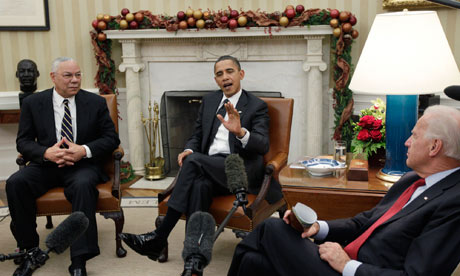Republicans may back Barack Obama's push to ratify nuclear treaty
The number three Republican in the Senate, Lamar Alexander, praised White House efforts on the 10-year plan

Barack Obama gained ground in his push for Senate ratification of a stalled nuclear treaty as once-reluctant Republicans signalled their willingness to back the pact with Russia.
Lamar Alexander, the number three Republican in the Senate, said today he was "wide open" to supporting the treaty if the administration addressed his concerns about modernisation of the remaining US nuclear arsenal. He praised the White House for working with senators.
"They're making important steps in the right direction," he said on MSNBC television. He said the treaty "has important advantages to our country in terms of the data and the verification".
The administration jump-started the treaty with a series of steps this week, including outreach efforts by the vice-president, Joe Biden, to senators and the circulation of a letter from the heads of the three US nuclear weapons laboratories expressing support for Obama's 10-year, $84bn (£54bn) plan to maintain the nuclear stockpile.
The laboratory directors said the administration's plan "would enable the laboratories to execute our requirements for ensuring a safe, secure, reliable and effective stockpile".
The treaty would cut the limits on strategic warheads to 1,550 for the United States and Russia from the current ceiling of 2,200. The pact also would establish new procedures to allow both countries to inspect each other's nuclear arsenals to verify compliance.
Republicans, led by Senator Jon Kyl, have rejected Obama's insistence that the treaty must be dealt with amid the pressing business of Congress' lame-duck session. Some have raised concerns that the treaty would limit work on a missile defence system, and they have pressed for sufficient funds for modernisation of the existing stockpile.
Foreign Relations Committee chairman, John Kerry, a Democrat, said in a speech on the Senate floor that he was encouraged by the discussions involving Republicans and the administration. He said he was hopeful for a "positive outcome, and we're certainly going to work in good faith to try to make that happen in the next days, hours".
Backers of the treaty circulated an op-ed from the Washington Post in which five former secretaries of state urged the Senate to ratify.
"We have here an agreement that is clearly in our national interest, and we should consider the ramifications of not ratifying it," wrote Henry Kissinger, George Schultz, James Baker, Lawrence Eagleburger and Colin Powell, who all served Republican presidents.
Countering that argument, former Reagan administration officials Edwin Meese and Richard Perle wrote an op-ed in The Wall Street Journal saying the pact falls short of those negotiated by President Ronald Reagan and they doubt he would have supported it.
